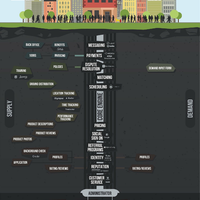Collection
Required Reading for Marketplace Entrepreneurs
From academics to analysts, startup founders to journalists, these 20 recently published pieces and books helped shape our thinking on the business dynamics, historical context, and future of marketplace companies.
This mega-essay by Lenny Rachitsky, former supply growth lead at Airbnb, synthesizes insights from 17 marketplace businesses, including Doordash and Etsy. Topics include how to drive supply and demand, growth levers, and maintaining quality.
Pared co-founder Dave Lu argues that not all marketplaces are created equal—and outlines the dimensions that influence marketplace success.

a16z’s Jeff Jordan (veteran marketplace operator and investor; former CEO of OpenTable and GM of eBay North America) and D’Arcy Coolican describe the opportunity to unbundle horizontal platforms into vertical marketplaces.

Li Jin and Andrew Chen of a16z trace the evolution of marketplace platforms, from listings to verticalized Craigslist models, “Uber for X” companies to managed marketplaces. The deck also explores the opportunities for consumers to discover and purchase services online.

For all the emphasis placed on liquidity, there are few resources that delve into how to measure it. Julia Morrongiello of Point Nine Capital cuts to the chase.

A failed Uber request inspired Trusted CEO Anand Iyer to write this deep dive into a critical (but oft overlooked) metric: search to fill.

From licensing requirements to one’s Net Promoter Score, a16z partner Li Jin unspools eight factors to consider when building a managed marketplace in a regulated category.

Marketplaces have two major camps of analysts: the business world and academia. In this paper, Harvard Business School professors Thomas Eisenmann and Scott Kominers provide a wonky overview of the causes of market failure.

The cinematic tale of Uber’s origin and its founder, Travis Kalanick, as reported by the New York Times technology reporter Mike Isaac who covered Uber.

The next wave of work opportunities will be in platforms that enable people to monetize their passions, predicts a16z’s Li Jin. Here’s how these marketplaces are treating individuality as a feature, not a bug.

a16z’s Jeff Jordan shares what makes marketplace business models so attractive, especially compared to classic ecommerce and retail.

As the founder and former CEO of TaskRabbit, Leah Solivan is intimately acquainted with the complexities of marketplace businesses, which she calls “the ultimate puzzle.” In this post, the entrepreneur-turned-VC (she’s now a general partner at Fuel Capital), describes how automation has transformed the building and scaling of marketplace businesses and streamlined the user experience.

